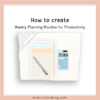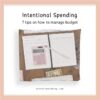It’s the beginning of the year, so why don’t we start with Success in mind?
What is success to you? And how does one become successful?
You’re about to get 100 ideas of good habits that’ll help you become a successful person. This is in good timing since we’re just in the first week of 2024 .
Whatever success means to you, may this 100 good habits list serves as your guide towards success.
“Successful people are simply those with successful habits”
Brian Tracy
The first time I heard this quote, I thought about what it meant in the context of grand achievements and earth-shattering accomplishments. However, over time, I realised that success doesn’t have to mean a jaw-dropping huge “thing”.
Success is many things.
It could be as simple as surviving one chaotic day.
Completing the tiniest step that aligns with the big goal.
Or just being consistent, doing a daily purposeful action towards an important objective.
For me success is to live as intentional as possible. Where I show up as the best version of myself as a Mum, wife, sister, friend and a blogger.
Success isn’t solely about one monumental effort but rather the culmination of daily, intentional choices and habits.
Go ahead and pick the habit of your choice and pick ones that will help you stay happy, rich and productive. And if you’re serious about building these habits, my only request is for you to take one habit at a time.
DISCLOSURE: This post contains Affiliate Links, which means I receive commission, at no extra cost to you, when you make purchase using those affiliate links. As an Amazon Affiliate, I earn from qualifying purchases. Here’s my full Disclaimer.
Want to develop a habit of weekly planning? Use this Free 2-page Sunshine Weekly Planner.
What are good habits?
Habits are routine actions that are performed regularly and often subconsciously, formed through repetition and reinforcement. The good habits are those that positively influence your daily life, productivity, well-being, and success.
Common types of habits are healthy habits and negative (or bad habits). Habits can either work for or against you. Naturally, good daily habits work for you and negative habits work against you.
The key is to cultivate habits that are aligned with your values and goals. One of the benefits of having good habits is a healthy lifestyle which can be considered a great success.
How do you develop positive habits?
Developing good habits requires commitment, consistency, and regular self-reflection. A great way to build your chosen new habits is to incorporate them into your daily routine. Practise them daily and to make it easier at the beginning, include the habit in your daily to-do list
One of the best meaningful habits that I developed over time is doing a weekly review. I’ve been doing this in the last 8 years and it’s one of the biggest reasons why I’ve been able to keep a healthy balance between my personal and professional life. It took a little while for me to develop and an intentional weekly planning routine but all the testing and the trial and error every single week paid off.
My biggest tip about developing good habits is using trackers. Here’s one of my savings trackers in my Bullet Journal.

Developing positive habits creates positive changes in life. So, if you want to develop positive habits, here’s my suggestion.
ONE: Identify the positive or good habits you want to build
Start by thinking about the positive lifestyle changes you want to have. Maybe it’s about improving your health, boosting your productivity, or deepening a relationship.
TWO: Prioritise the habit that creates a huge impact on the quality of your life.
Pick just one up to three main goals or one main objective. Then, pick the habits that will help you achieve those goals. Be specific and focus on only one or two habits at a time
THREE: Create a routine.
A routine comes first before the habit.
Let me explain.
A routine is a conscious and intentional set of actions that you choose to repeat regularly. Examples are the morning routine or evening routine. As you repeat your routine and it gets more ingrained it evolves into a habit.
A habit is a behaviour that becomes automatic and subconscious through repetition over an extended period within a routine.
Put simply a routine is a deliberate sequence of actions, while a habit is a behaviour that becomes automatic over time.
Here’s my current morning routine, hope it inspire you to create one for yourself too.

When developing a habit, I always like to start with morning routine. Here’s a blog post to keep in mind should you need to revamp your morning routine.
FOUR: Start Small
Begin with the smallest and easiest step towards your desired habits. Celebrate each small win and increase the steps, difficulty, or intensity over time.
FIVE: Be self-accountable
You can do it alone of course, but the best way to stay accountable is to find an accountability partner or an accountability group.
Use a physical habit tracker or a habit-tracking app.
I like telling my family members what habit I’m building because reminding each other of goals is one of the things we do in our household.
As a blogger, my favourite accountability group is inside the Passive Income Pathways VIP Membership. Ahhh I don’t even know where to begin. This is a community where it honours massive and scary goals with big bold steps and at the same time appreciate the small, steady and consistent habits. (like daily accountability).
I have never been this committed to follow a path like the PIPS Path Guide.
What’s a good habits list
A good habits list is a collection of positive habits that contribute to physical, health, personal development, money mindfulness, well-being, and success in personal or social life.
A good habits list, includes categories like:
- Financial Habits for Wealth
- Health, Wellness, and Relationship Habits for fulfilment and happiness
- Personal Development Habits for Growth and Wisdom
- Organisational Habits for Efficiency
- Productivity habits for making the most time
In 2021, I made a commitment of creating at least one habit related to family (love and connections) and passion (blogging about intentional living).
And even though I’ve been practising gratitude daily since I was young, I also included it, because… why not?

100 Good Habits List
Before you go through the 100 good habits list, would it be ok if I ask you to do something first?
Pause for a moment and think of just one thing that you want to achieve in the next month or so. Take note of it and then pick 3 to 4 habits that you can build each week to achieve that one thing.
Here is the giant list of good habits that you can start implementing from this week. Imagine how great it would be if each week, you practise just one habit from this list.
For Money

- Checking your cash flow weekly/monthly/quarterly or yearly.
- Letting go of non essential expenses
- Paying attention to your expenses by keeping an expense tracker
- Setting aside money first every time you get money from any resource
- Investing in resources that further develop your financial knowledge
- Saving a certain percentage of income regularly
- Setting and reviewing financial goals regularly
- Living below your means
- Diversifying sources of income
- Avoiding unnecessary spending
- Paying off credit cards to avoid interests
- Paying bills before the due to avoid late payment fees
- Avoiding extra cost by practicing intentional spending
- Staying organised to avoid costly mistakes
- Sticking to a list when grocery shopping
The best way to practise intentional spending is to sue money trackers. Grab the free money trackers by clicking the image below or just download it from here.
For Health
- Exercising regularly
- Limiting Social media use
- Swapping healthy food over treats or sometimes food
- Limit blue light exposure by setting unplug hours before bedtime
- Eating a balanced diet
- Staying hydrated by drinking at least 8 glasses of water
- Taking cold showers
- Practising a consistent sleep routine
- Limiting screen time
- Taking regular breaks
- Doing regular health checks
- Prioritise self-care
- Practicing self-compassion
- Journaling
- Practicing daily reflection
- Taking fresh air
- Reading
- Taking care of your mental well-being
- Eating healthy breakfast
- Doing deep breathing exercises
- Taking regular brain breaks
- Taking moments for mindfulness
- Having a simple and healthy meal plan
- Taking cold showers
Sharing my sleep tracker in my bullet journal. It took me 9 months and a lots and lots of do over before I establish a good sleep hygiene.

For Happiness
- Practicing daily gratitude
- Wake up early
- Cultivating a positive mindset
- Appreciating the simple things
- Spending time in nature
- Connecting with loved ones
- Making time for activities you love
- Practicing mindfulness or meditation
- Celebrating small wins
- Showing kindness others
- Practicing self-compassion
- Letting go of grudges
- Choosing a positive attitude
- Avoiding negative self-talk
- Being a good listener
- Using Positive affirmations
- Looking for the good in everything
- Learning new things
- Spending quality time with family and friends
- Trying new hobbies
- Trying new ways to live a better life
- Lowering expectations
- Taking notes of ideas of what makes you happy (and implementing them)
For Productivity
- Planning the day the night before
- Doing the important tasks first
- Set daily goals
- Getting ahead with food preparation and household chores
- Prioritising tasks
- Breaking goals into tasks
- Setting realistic deadlines
- Saying no
- Simplifying things by being clear with what needs to be done
- Using time block
- Batch processing similar tasks
- Using templates for saving time
- Creating systems and workflows
- Writing things down
- Embracing growth mindset
- Practising an end-of-day routine
- Decluttering physical space
- Setting priorities
- Using Calendars and Planners
- Setting time limits for tasks and using a timer
- Setting healthy boundaries
- Managing distractions
- Limiting multitasking
- Taking the most of your time by doing what matters first
- Staying organised
- Keeping a tidy workspace
- Organizing belongings systematically
- Developing a cleaning routine
- Creating a filing system for documents
- Building a second brain
- Keeping a simple routine
- Maintaining a “done list” to remind you of your daily wins
- Taking regular breaks in between tasks
- Having plenty of sleep
- Being in a supportive accountability group
- Writing an intentional daily to do list
- Using a Pomodoro method
- Practising the Pareto Principle
Your next step
Now that you have 100 ideas of healthy habits, your next step is to pick a few first and then narrow it down into 1 up to maximum of 3 habits to focus on.
Then start practising those habits.
Please remember to use a tracker to build and maintain momentum.
If you want to develop a habit of weekly planning, Use this Free 2-page Sunshine Weekly Planner.






















